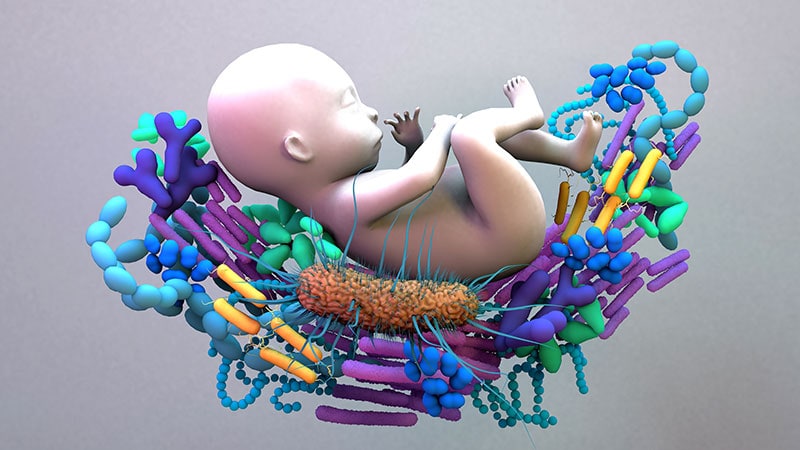Impact of Gut Microbes on Children's Cognitive Function
Core Concepts
Specific gut microbes influence children's cognitive function.
Abstract
TOPLINE:
Gut microbes linked to cognitive function in children aged 18 months to 10 years.
METHODOLOGY:
Relationship between microbiome, neuroanatomy, and cognition analyzed in 381 children.
Stool samples correlated with cognitive and behavioral assessments.
Shotgun metagenomic sequencing used to analyze DNA.
MRI data used to predict brain region volume influenced by microbial profiles.
TAKEAWAY:
Increasing variation in microbial species correlated with cognitive function scores.
Enriched species positively associated with higher cognitive function.
Sutterella wadsworthensis negatively linked to cognitive function.
Key taxa predicting cognitive function also important for brain regions.
IN PRACTICE:
Understanding the gut-brain-microbiome axis crucial in early life.
SOURCE:
Study led by Kevin S. Bonham, PhD, published in Science Advances.
LIMITATIONS:
Reliability issues due to multiple cognitive assessments and pandemic impact.
DISCLOSURES:
Study funded by US National Institutes of Health and Wellcome: LEAP 1kD.
Certain Gut Microbes Tied to Cognitive Function in Children
Stats
Researchers analyzed stool samples from 381 children aged 40 days to 10 years.
Increasing variation in microbial species correlated with cognitive function scores.
Several microbial species enriched in children with higher cognitive function scores.
Sutterella wadsworthensis negatively associated with cognitive function.
Key taxa predicting cognitive function also important for brain regions.
Quotes
"Understanding the gut-brain-microbiome axis in early life is particularly important since differences or interventions in early life can have outsized and longer-term consequences than those at later ages." - Authors
Key Insights Distilled From
by Marilynn Lar... at www.medscape.com 01-19-2024
https://www.medscape.com/viewarticle/certain-gut-microbes-tied-cognitive-function-children-2024a10001ii
Deeper Inquiries
How can interventions in early life positively impact cognitive function in children?
Interventions in early life can positively impact cognitive function in children by targeting the gut-brain-microbiome axis. The research findings suggest that specific species of gut microbes are associated with cognitive function in children. By understanding and manipulating the composition of these microbes through interventions such as probiotics, prebiotics, or dietary changes, it may be possible to enhance cognitive function in children. For instance, enriching the gut with beneficial microbes like Alistipes obesi, Asaccharobacter celatus, Eubacterium eligens, and Faecalibacterium prausnitzii, which were found to be significantly enriched in children with higher cognitive function scores, could potentially improve cognitive outcomes. Therefore, early interventions that target the gut microbiome could have long-lasting effects on cognitive development in children.
What are the potential implications of the reliability issues in the study on the findings?
The reliability issues in the study, such as test-retest reliability and differences between test administrators, could introduce noise into the observations, particularly in the youngest children. This noise may affect the accuracy and consistency of the cognitive function scores obtained from the assessments. As a result, the associations between specific gut microbes and cognitive function could be influenced or obscured by these reliability issues. The findings may not fully capture the true relationship between the gut microbiome and cognitive function in children if the data collected is not reliable. Therefore, the implications of reliability issues in the study suggest that the associations reported between gut microbes and cognitive function should be interpreted with caution and may require further validation through more robust study designs.
How might the pandemic impact have influenced the results of the research?
The pandemic impact during the study period, particularly the lockdowns, could have influenced the results of the research in several ways. The study mentions that score reductions due to the lockdowns were more pronounced in some age groups than during the recruitment period. This suggests that external factors like the pandemic may have affected the cognitive function scores of the children, potentially confounding the relationship between gut microbes and cognitive function. The stress, changes in routine, and disruptions caused by the pandemic could have had indirect effects on the gut microbiome composition and cognitive development of the children, leading to altered results. Therefore, the pandemic impact may have introduced additional variables that were not accounted for in the study, potentially influencing the outcomes and interpretations of the research findings.
0
